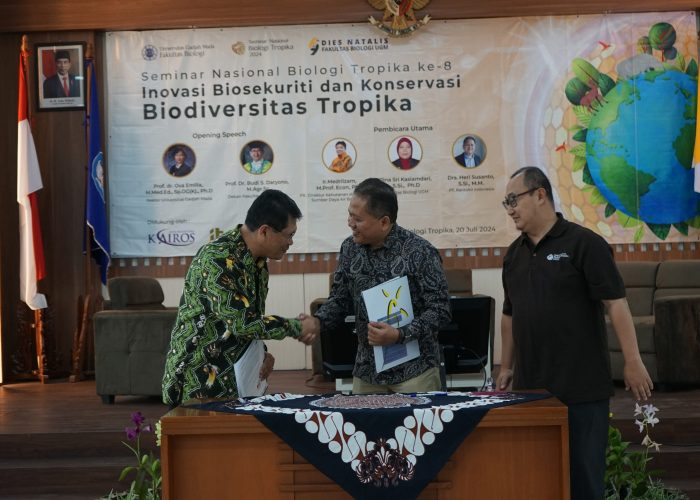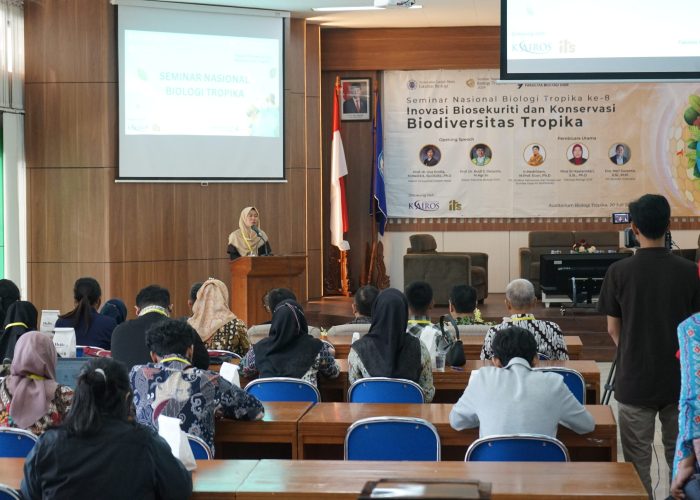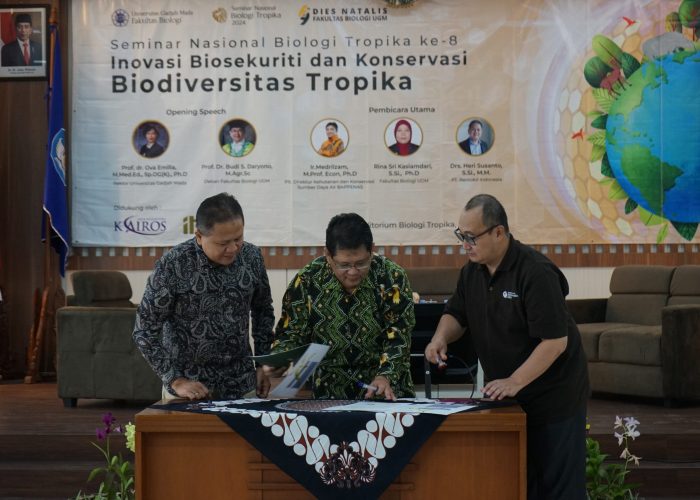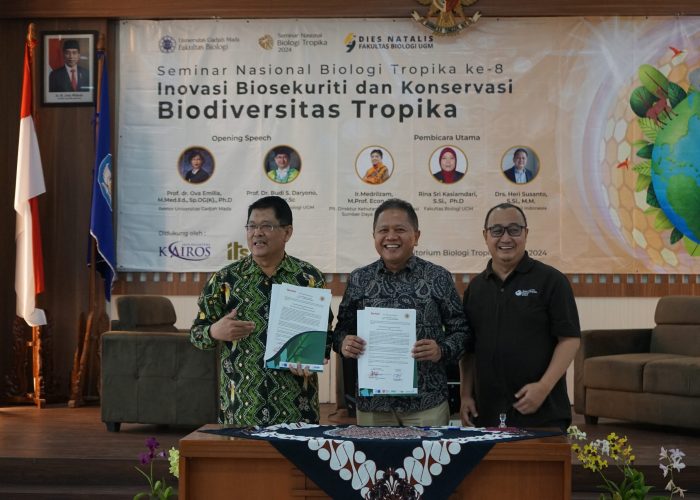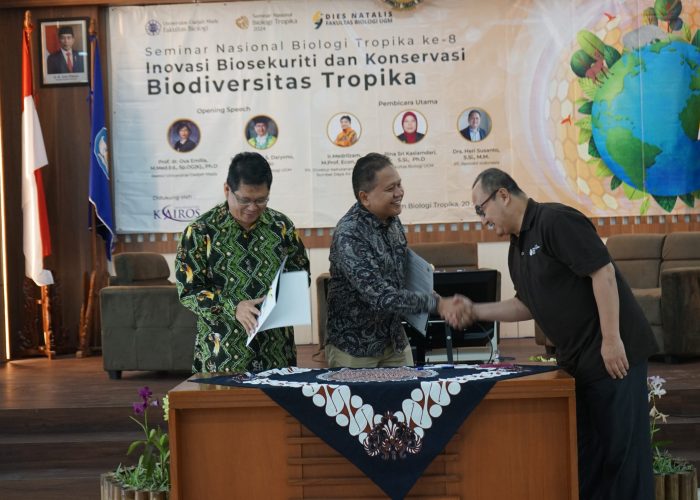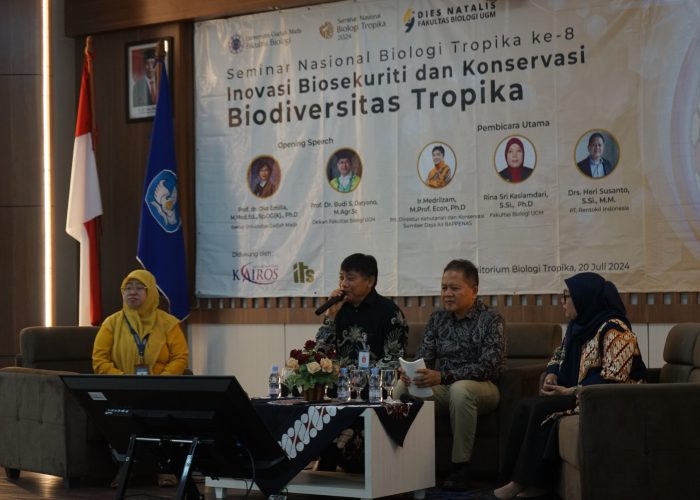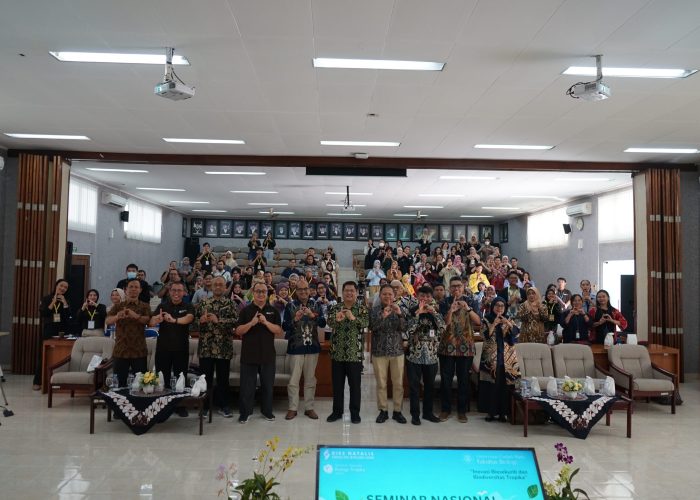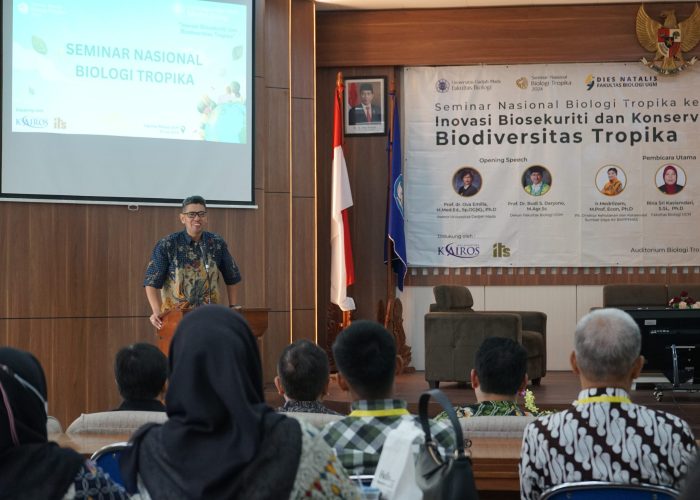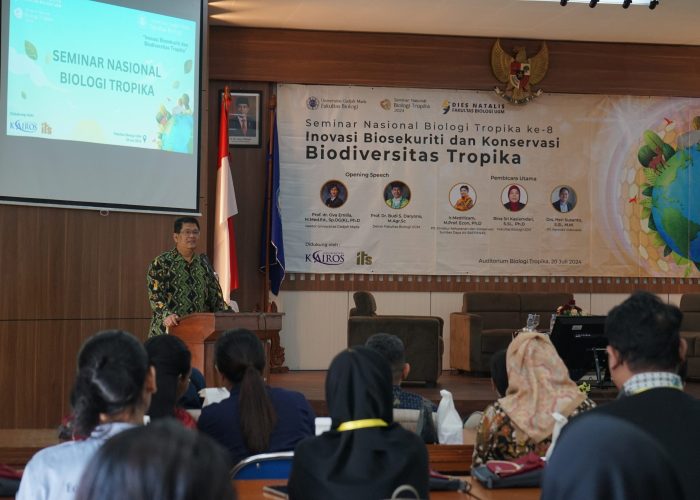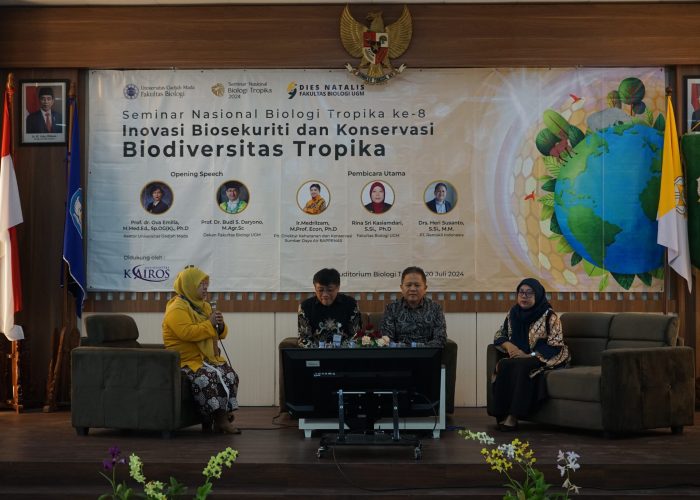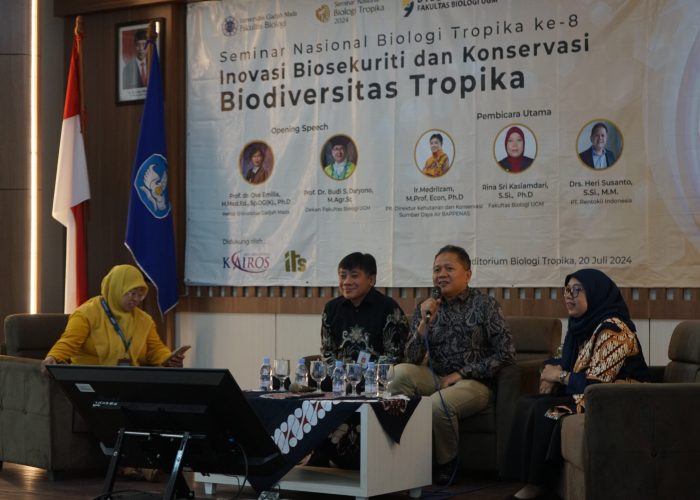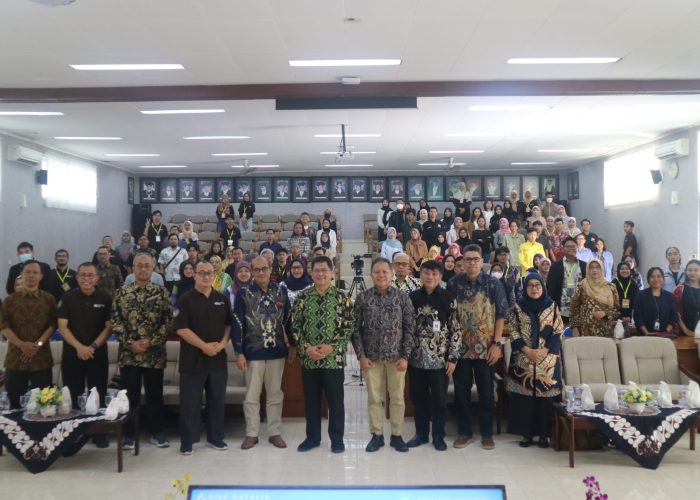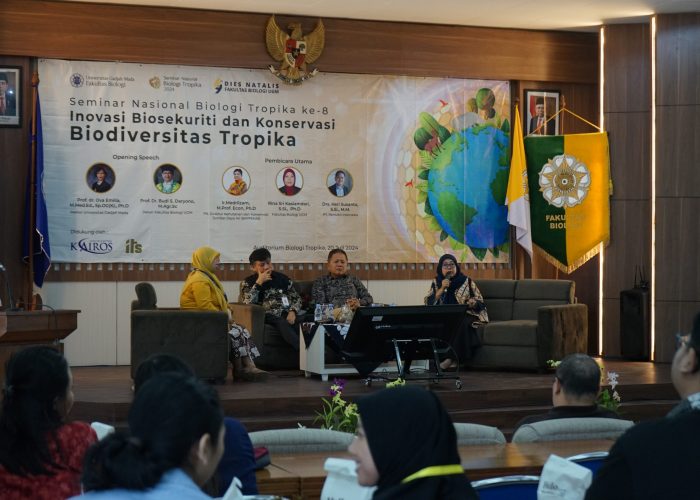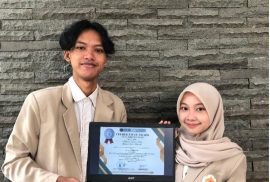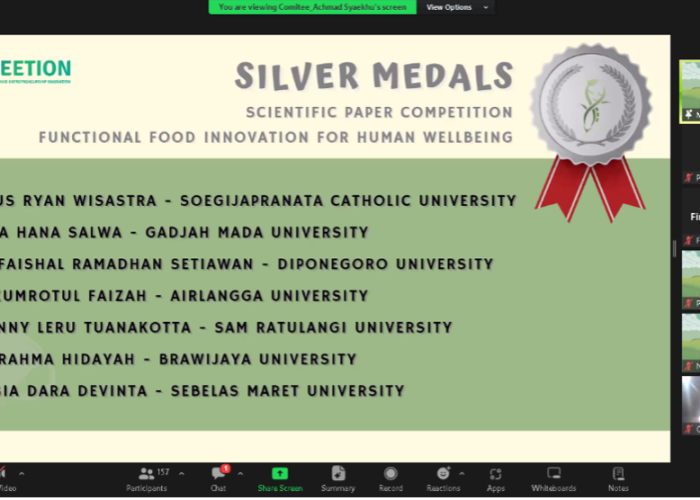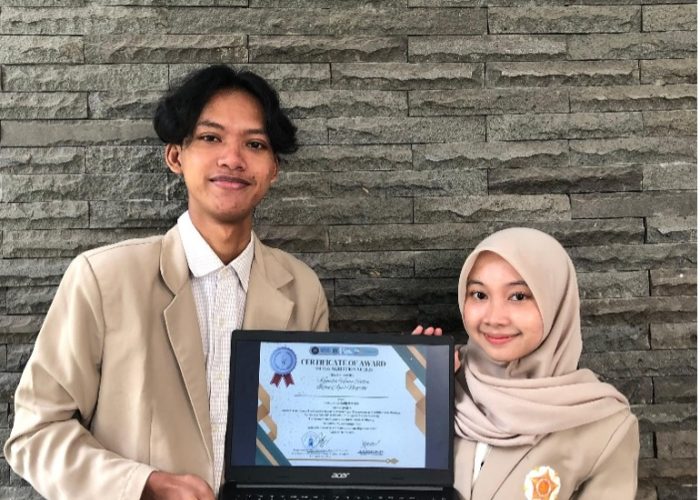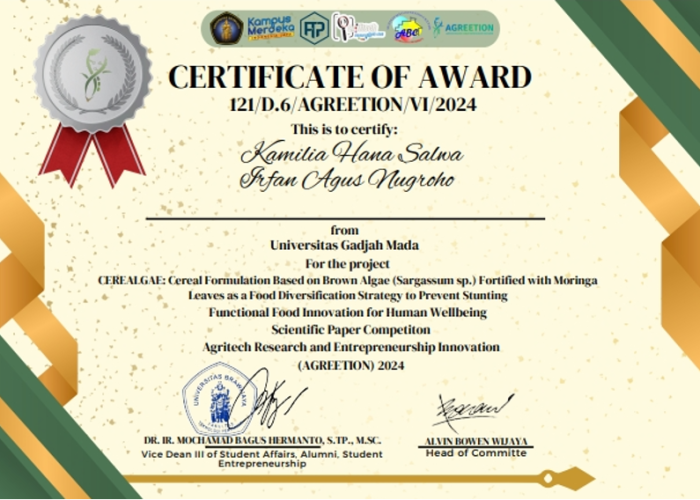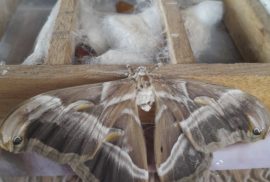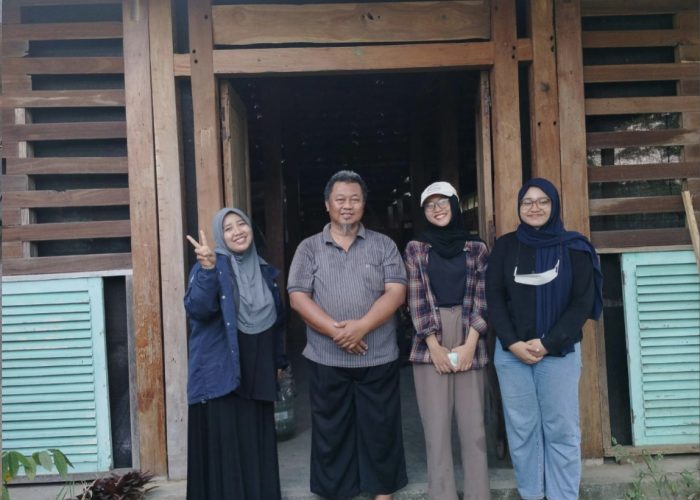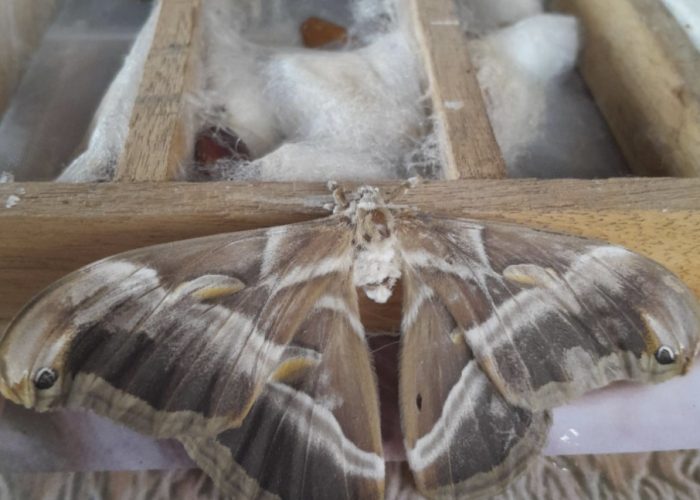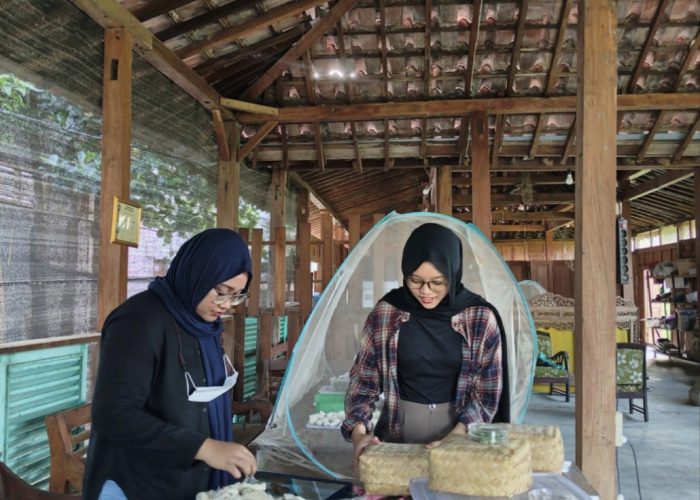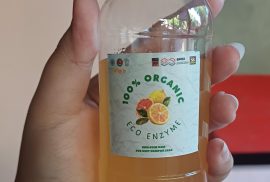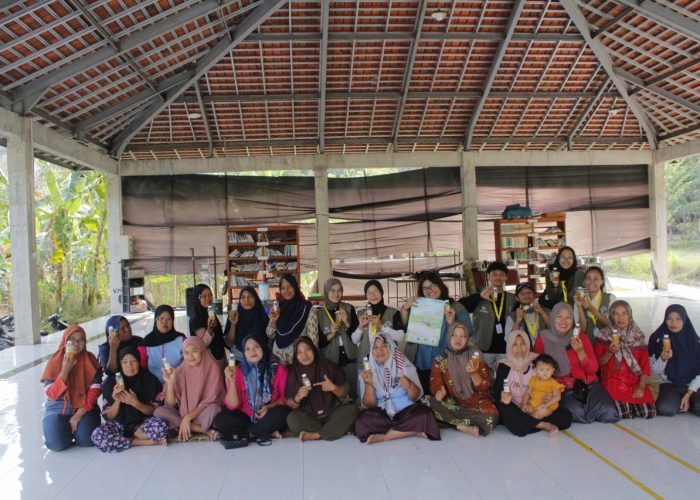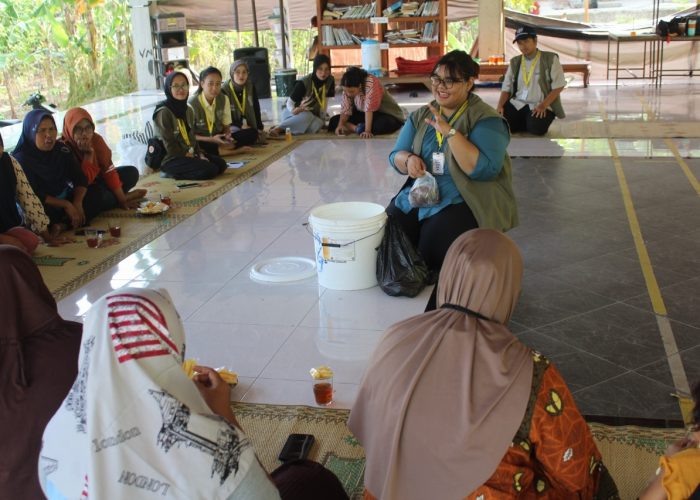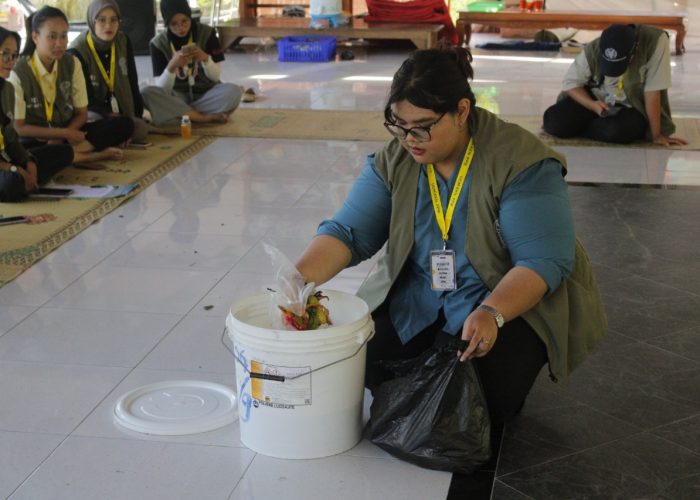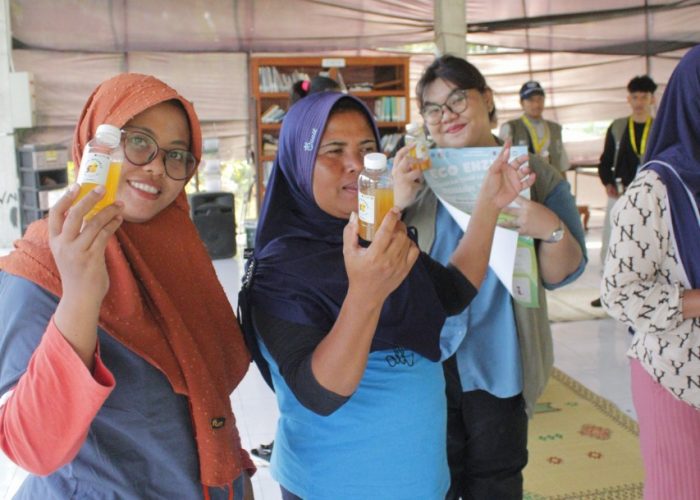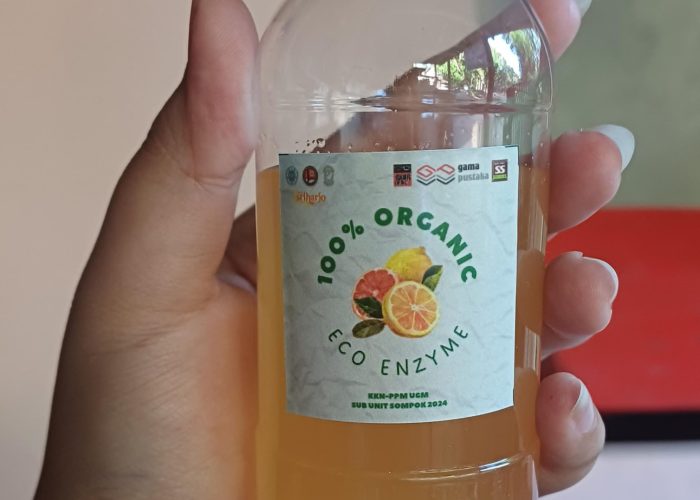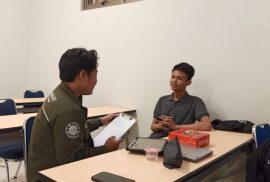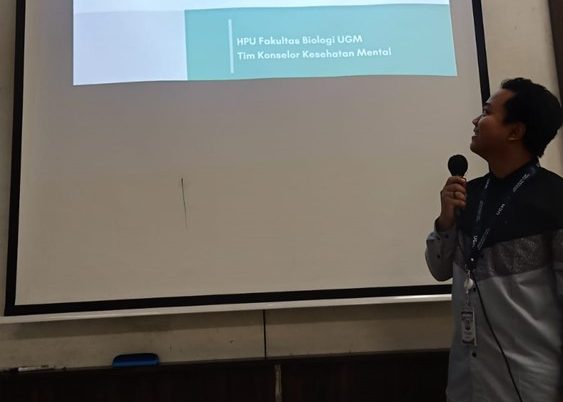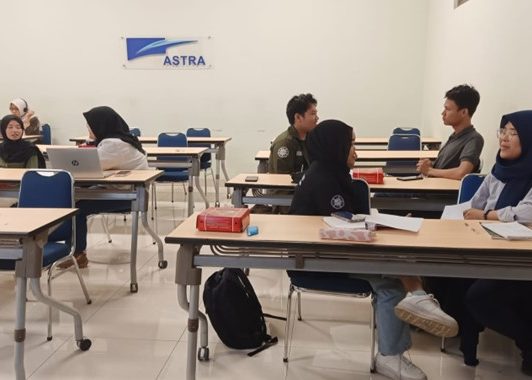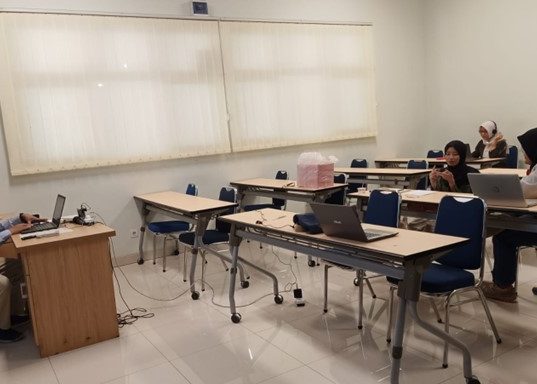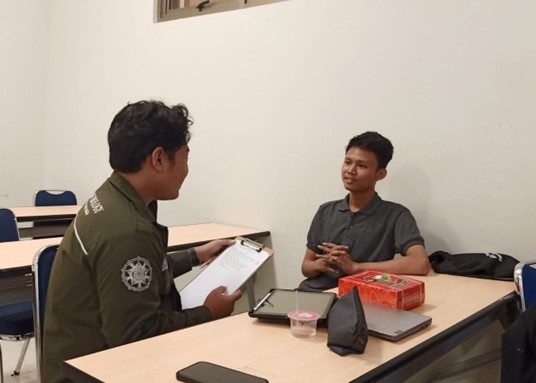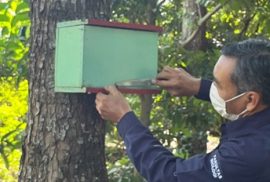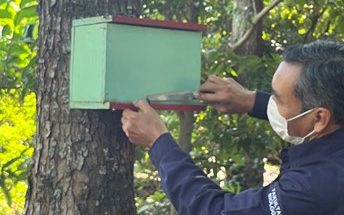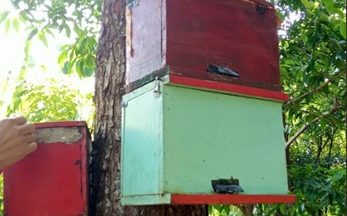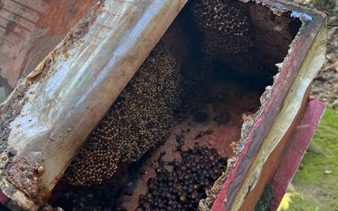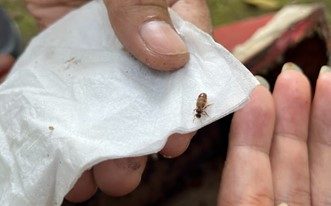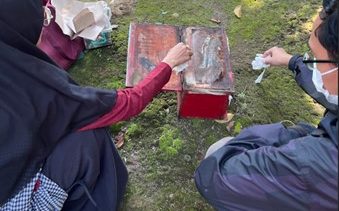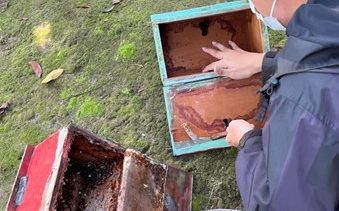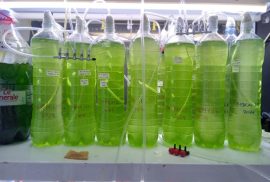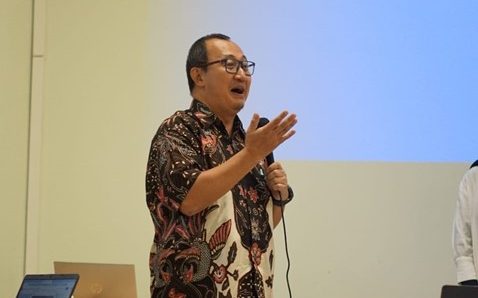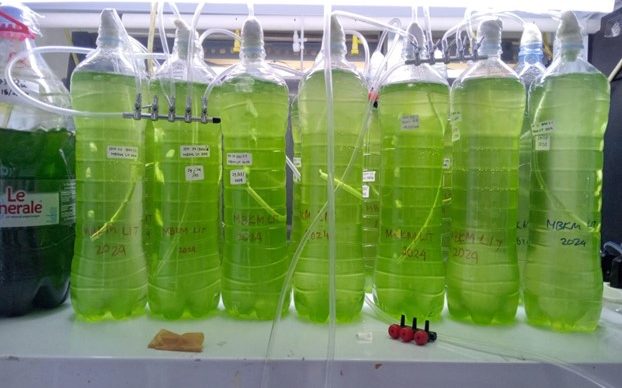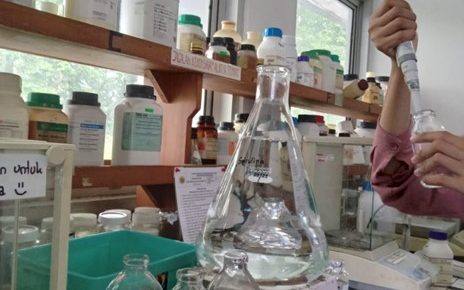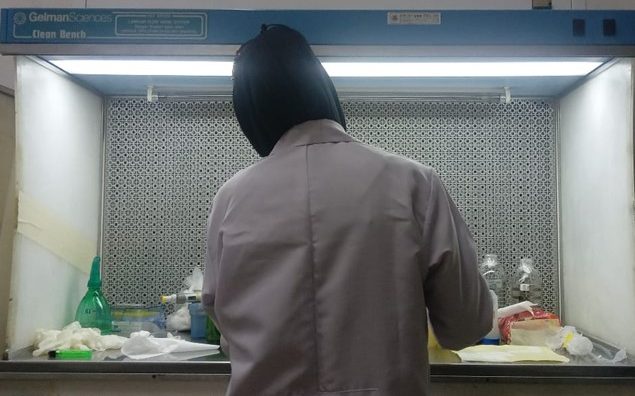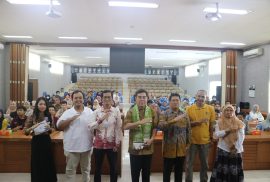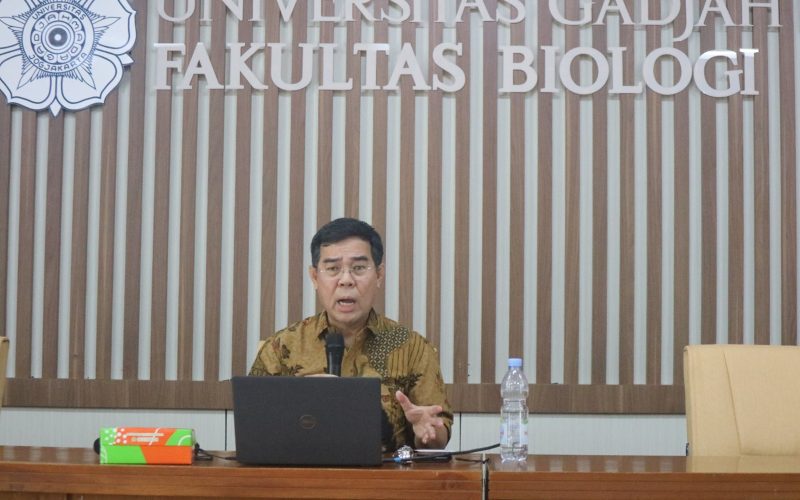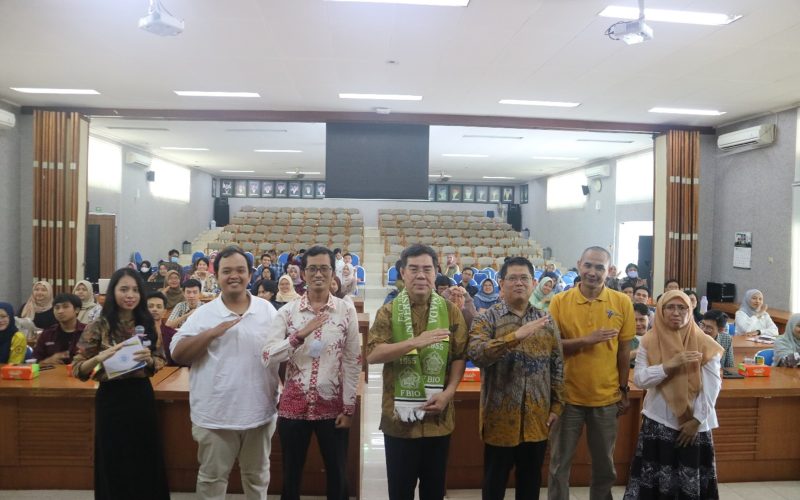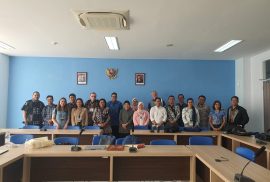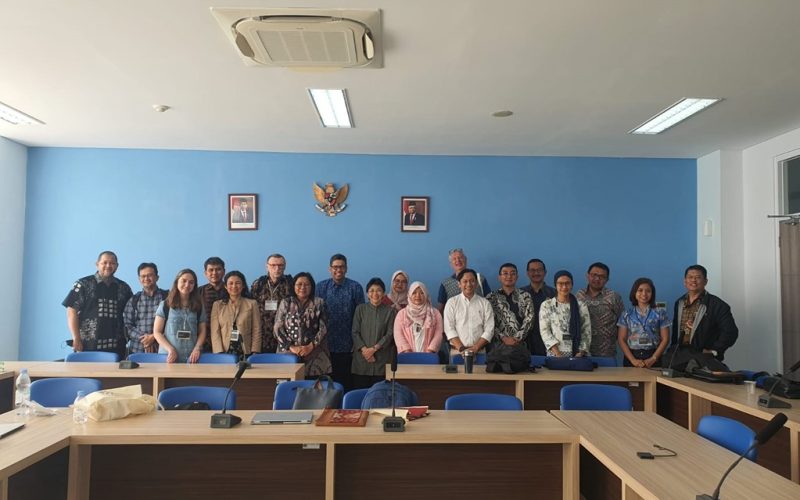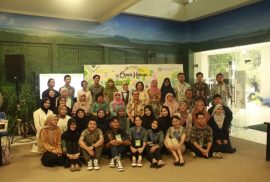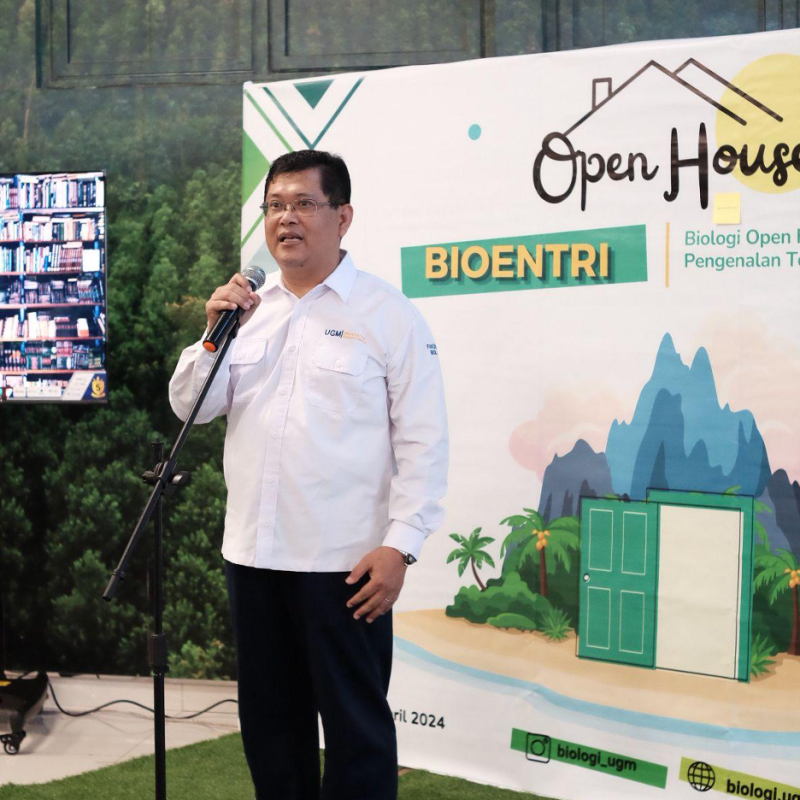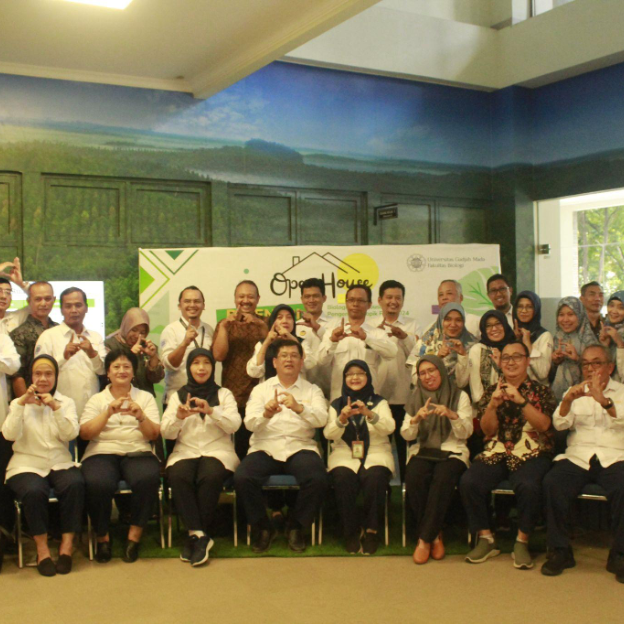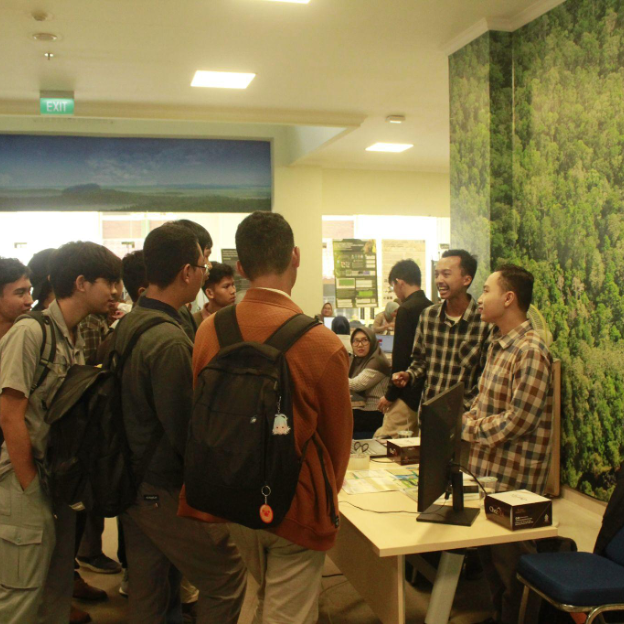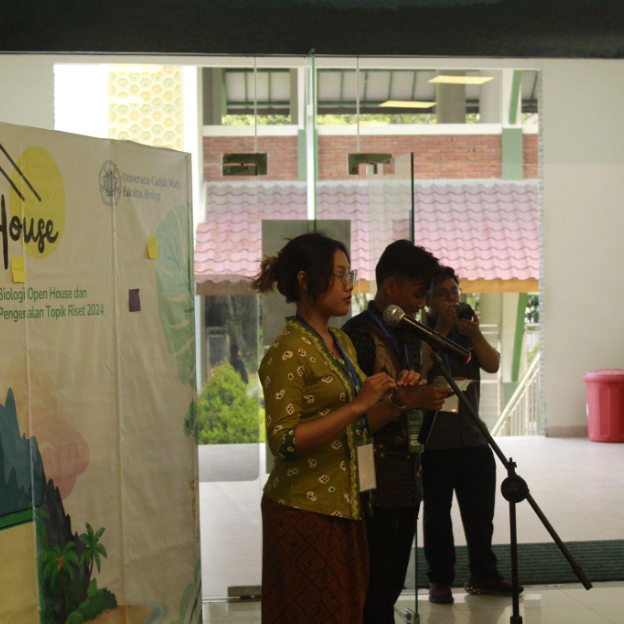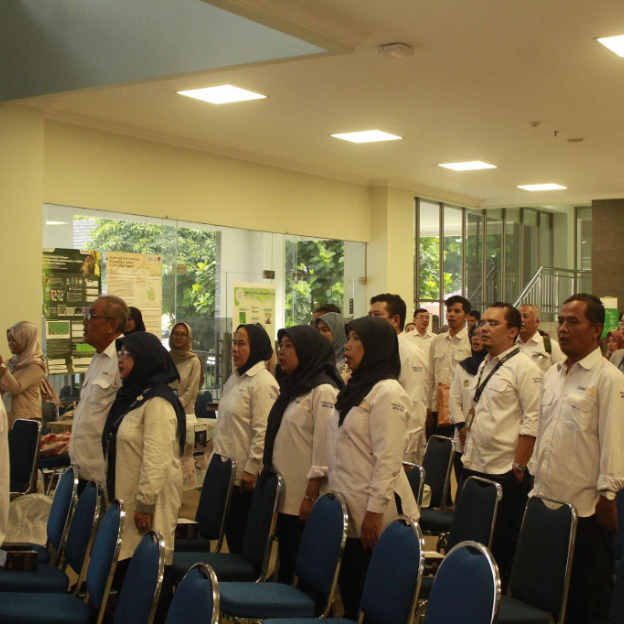Arsip:
SDG 9 : Increase Industry, Innovation, and Infrastructure
Yogyakarta, 20 July 2024 — The Faculty of Biology, Universitas Gadjah Mada (UGM) held the 8th National Seminar on Tropical Biology (SNBT) on 20 July 2024. This year, the seminar was held in a hybrid with “Biosecurity Innovation and Tropical Biodiversity Conservation” theme. This event, which was held at the Auditorium of the Faculty of Biology, aims to provide a platform for academics, researchers, practitioners and students to discuss current issues and innovative solutions in biosecurity and biodiversity conservation in tropical regions. This seminar activity began with a report from Dr. Siti Nurbaiti as chair of the 2024 SNBT Committee, followed by remarks by Prof. Dr. Mirwan Ushada, Director of Research representing the Rector of UGM and opened by Prof. Dr. Budi Setiadi Daryono. M.Agr.Sc., as Dean of the Faculty of Biology UGM. This seminar was attended by around 100 participants from 21 institutions in Indonesia. On this occasion, an MoU was also signed between the Faculty of Biology UGM and PT. Rentokil Indonesia. It is hoped that this collaboration can be a form of synergy between academics and industry, especially regarding the issue of biosecurity and Indonesian biodiversity.
As the first keynote speaker, Ir. Medrilzam from BAPPENAS raised the topic “The Role of Government Policy for Biodiversity Conservation”. In his presentation, Ir. Medrilzam delivered the Indonesian Biodiversity Strategy and Action Plan (IBSAP), the Indonesian government’s strategy for preserving biodiversity, and how these policies are expected to shape people’s behavior towards a positive nature.
As the second speaker, Drs. Heri Susanto from PT. Rentokil Indonesia discussed “The Role of Biological Science and Digital Technology in Sustainable and Environmentally Friendly Pest Control”. In this session, Drs. Heri Susanto conveyed the exploration of the integration of biological science with digital technology to develop pest control methods that are more effective and environmentally friendly.
The third speaker, Mrs. Rina Sri Kasiamdari, Ph.D. delivered material on “The Role of Fungi in Biosecurity and Biodiversity Conservation”. The focus of this discussion is the role of fungi as biosecurity agents in maintaining biodiversity, as well as how fungi can be used in conservation efforts.
The plenary session of the three speakers was enlivened with questions from seminar participants ranging from biodiversity protection related to infrastructure developments to opportunities for food source options with high nutrition from the variety of diversity that Indonesia has to meet food needs and in terms of handling. pest. The seminar activities were continued with parallel sessions filled with presentations by the participant speakers on various research titles, which were carried out offline and online.
The 8th SNBT in 2024 was closed by Dr. Eko Agus Suyono, M.App.Sc., as Vice Dean for Research, Community Service, Collaboration and Alumni Affairs. In his closing remarks, he said that SNBT is a forum for increasing understanding of biosecurity and tropical biodiversity conservation through in-depth discussions with experts in the field, thereby inspiring innovation and collaboration between academics, researchers and practitioners in efforts to protect biodiversity, encourage policy development and new strategies that can be implemented to preserve the environment and support the sustainability of tropical ecosystems. It is also hoped that this national seminar will create synergistic cooperation between the participants who attend, which is expected to be a positive thing that can build and provide more impact regarding issues related to the topic of biosecurity and tropical biodiversity conservation in the future. Furthermore, this seminar plays a role in implementing several points of Sustainable Development Goals (SDG’s): 2. Zero hunger, 3. Good health and well-being, 4. Quality education, 6. Access to clean water and sanitation, 7. Affordable and clean and energy, 9. Industry, innovation and infrastructure, 11. Sustainable cities and communities, 13. Climate change action, 14. Maintaining marine ecosystems, 15. Maintaining land ecosystems and 17. Partnerships for the goals.
The CEREALGAE team from The Faculty of Biology UGM, led by Hana Salwa (Biology 2022) along with Irfan Agus Nugroho (Biology 2021), successfully won a Silver Medal Quartile at the Agritech Research and Entrepreneurship Innovation (AGREETION) 2024 competition. The AGREETION 2024 is an international scientific paper and business plan competition organized by the Agritech Research and Study Club (ARSC) of the Faculty of Agricultural Technology, Universitas Brawijaya, with the theme ‘’Accelerating Agriculture and Agro-Industry Towards Sustainable Welfare with Eco-Friendly and Clean Production Principles.’’ Forty two universities from 3 countries participated in this competition that was held online from April 20 to June 1, 2024.
The team presented an essay titled “CEREALGAE: Cereal Formulation Based on Brown Algae (Sargassum sp.) Fortified with Moringa Leaves as a Food Diversification Strategy to Prevent Stunting.” The essay was motivated by the high stunting incidence in Indonesia. Aligned with the government’s efforts to achieve Sustainable Development Goals (SDGs) No 2, which aims to end hunger, achieve food security, and improve nutrition, along with the “Gerakan Nasional (GerNas)” program, food diversification can be a preventive measure to ensure that toddlers receive proper nutrition. One approach to achieving this goal is to optimize the utilization of natural ingredients, such as Sargassum sp. and moringa leaves, as functional food ingredients.
Sargassum sp. is a type of brown algae with high abundance and contains macronutrients like carbohydrates, proteins, lipids, and several micronutrients. The protein in Sargassum sp. can aid in cell regeneration during growth and repair, making it recommended for children’s growth phases. Fortifying food with moringa leaf powder can increase the protein, zinc, iron, calcium, and magnesium content. Moringa leaf powder contains about 27.1 g of protein, making it an excellent alternative to animal protein. A study indicates that moringa leaf fortification can significantly increase toddler weight and reduce acute nutrient deficiencies two months after consumption. The Indonesian society’s tendency to consume instant or fast food prompted the biology student team to create a functional food innovation in the form of cereal made from Sargassum sp. and moringa leaves. This innovation is expected to be one solution to reduce the prevalence of stunting in Indonesia through functional food diversification utilizing natural ingredients. Author: Kamilia Hana Salwa.
Yogyakarta, June 1, 2024- The Independent Learning Independent Campus (MBKM) 2024 Research Team from the Faculty of Biology, under the supervision of Sukirno, S.Si., M.Sc., Ph.D., with the project titled “DNA Barcoding of the Wild SilkWorm Samia sp. Boisduval, in Yogyakarta,” made their first visit to their research partner, Jantra Mas Sejahtera, also known as Omah JAMTRA in Wates, Kulon Progo, DI Yogyakarta. This visit was attended by two members of the research team, Saifa Salwa Arrahma and Irenna Sheva Zahrani, along with their mentor, Siti Shofa Assyifa’ul Qulbi Barid, S.Si., M.Sc. The visit aimed to introduce the partner organization and to enhance the team knowledge regarding the Samia cultivation and species in Yogyakarta, identify superior Samia strains, and strengthen cooperation with JAMTRA.
The event began with an introduction by Mr. Yunianto Hargo Nugroho, S.Hut., the head of Omah JAMTRA. He explained the cultivation of Samia and the history of Omah JAMTRA. He shared his expertise and experience in Samia silkworm cultivation, emphasizing the importance of understanding the morphology of silkworms to avoid errors in morphological data collection. Pak Anto showcased the first instar larvae of Samia currently being cultivated and explained the metamorphosis process of the silkworms, as well as the environmental factors that need to be controlled for successful cultivation. He underlined the key factors in Samia silkworm cultivation, including jatropha leaves as feed, maintaining appropriate temperatures, and ensuring the cleanliness of the rearing cages.
The visit also included a discussion regarding silkworm cultivation at Omah JAMTRA and the research conducted by the team. The MBKM Research collaboration with JAMTRA is expected to contribute to the Sustainable Development Goals (SDGs) specifically: No Poverty, Quality Education, Industry, Innovation, and Infrastructure, and Partnerships for the Goals.
Wednesday, July 10, 2024, The Faculty of Biology Universitas Gadjah Mada (UGM) proudly announces an event titled “Workshop on Eco Enzymes Production from Fruit Peel Waste.” This activity is part of the Community Service Program (KKN) coordinated by Nur Indah Septriani, S.Si., M.Sc., Ph.D., a lecturer at the Faculty of Biology, UGM, and led by Rizquita Brillianti, a student from the Faculty of Biology, UGM. The workshop took place at the SSB Pavilion in Dusun Sompok, Sriharjo. The workshop was attended by 20 participants from the Sompok Women Farmers Group (KWT) and the village head, Mrs. Nur Latifah.
The workshop is designed to teach the Women Farmers Group to transform fruit peel waste into eco enzymes. Eco enzymes could reduce the reliance on chemical products in daily activities, promoting eco-friendly products to decrease environmental pollution. This objective aligns with the Sustainable Development Goals (SDGs), particularly SDGs No.3 on Good Health and Well-being, SDGs No.6 on Clean Water and Sanitation, SDGs No.7 on Affordable and Clean Energy, and SDGs No.12 on Responsible Consumption and Production. It is hoped that the Women Farmers Group will obtain new knowledge and support the efforts to preserve the environment sustainably.
On Friday (5/7), the Health Promoting University (HPU) team and Faculty Counselors Faculty of Biology UGM Counselors organized a training session for Buddy Counselors to prepare their skills for assisting new students in 2024. This year’s Buddy Counselor team is the second cohort following the establishment of the peer counselor team, called Buddy Counselors, by the HPU team and Faculty of Biology Counselors last year.
The Buddy Counselor 2024 team consists of 28 active students who received training and inaugurated on May 20, 2024. The training session was guided by Yudhistira Adi Perdana, M.Psi., a psychologist from the Faculty of Biology UGM . This activity is part of the HPU Faculty of Biology’s work program, chaired by Titin Fauziah, SE., MBA. The Buddy Counselors supported by the Faculty Psychologist and assisted by Faculty Counselors, including Dwi Umi Siswanti, S.Si., M.Sc., Dr. rer. nat. Abdul Rachman Siregar, M.Biotech., and Dr. Dwi Sendi Priyono, S.Si., M.Si.
The Buddy Counselors received training in active listening skills, life goal mapping, and practical sessions in active listening. This team will work alongside the PPSMB Faculty of Biology guides in assisting the 2024 new student cohort. The Buddy Counselor program is the first of its kind in the Faculty of Biology, aimed at helping new students adapt to their new environment, academic life, and all its intricacies. The team provides academic orientation and tracking the mental health of new students to minimize risks throughout their studies at the Faculty of Biology UGM.
“Active listening begins with our willingness to listen to the counselee’s story, paraphrasing, summarizing, clarifying, and providing support. We should focus on the counsellee,” explained Yudhis. “We hope that this new student assistance program becomes a tradition in our faculty, helping new students smoothly transition from high school to university life,” expressed Titin in her remarks. This assistance also facilitates the Faculty Counselors’ efforts in identifying mental health issues early and preparing measures to prevent self-harm and suicide.
The Klanceng Bees Propolis MBKM Research 2024 team has begun their research activities under the guidance of Drs. Ign. Sudaryadi, M.Kes.. The team consists of Muna Sa’adah and Vincencio Valdy Putra Sasangka. This activity builds upon previous research to enhance studies on Klanceng bees propolis. The partner for this activity was PKBM Ibnu Hajar, Sirahan, Salam, Magelang.
The MBKM Research team collaborated with the MBKM-PkM team, which includes Cinta Louisa, Rr. Liliane Gemma, and Hasna Zuhaida. The first activity was held online via Zoom on Tuesday, January 26, 2024, with Drs. Ign. Sudaryadi, M.Kes. as the speaker. This session discussed the outputes of MBKM Research and community service, the types of bees under study (Klanceng bees), and their products. The second activity, held on Friday, February 12, 2024, focused on Klanceng bees cultivation. On Saturday, March 9, 2024, the team visited Kebon Pasinaon at PKBM Ibnu Hajar, Sirahan, Magelang, for an introductory meeting. The team was warmly welcomed by representatives of PKBM Ibnu Hajar, and discussions related to program plans followed.
As the initial activity of the MBKM program, colony splitting of Klanceng bees, raw propolis sampling, and Klanceng bee pollen collection were carried out. This took place on Saturday, May 4, 2024, at the Sawitsari Research Station. The colony splitting aimed to strengthen the cultivation process of Klanceng bees, with the expectation of increasing the number of colonies and, consequently, the production of bee products.
Raw propolis, a resin used as a construction material for the hive, was collected. Pollen, the flower’s pollen stored in pollen baskets as a food reserve for the bee colony, was also harvested. These were collected by taking the pollen baskets located at the base of the hive. Pollen is distinguishable by its lighter color and denser texture. Propolis was obtained by extracting Klanceng honey and taking the remaining hive material. This propolis is still mixed with pollen, honey, and other debris, hence referred to as raw propolis. After obtaining the required amounts of propolis, pollen, and honey, they were stored for further research in the future.
MBKM Research Team of Class 2024 as part of the Microalgae Research team in the Biotechnology Laboratory, Faculty of Biology, UGM, supervised by Dr. Eko Agus Suyono, S.Si., M.App.Sc. has carried out research on “Production of Local Strain Microalgae Euglena sp. as a source of antioxidants and immunostimulants at PT. Indoalgae Aquaculture, Pasuruan”. This team consists of five members; Indira Amani Kurniawan, Laila Mei Marwadani, Renisha Windy Puspita Sari, Sri Setyaningrum, and Tizania Putri Langithari.
The MBKM Research team focuses on development and innovation in the cultivation of Euglena sp., especially local strains isolated from the Dieng plateau, Indonesia. Antioxidants produced by Euglena sp. can help protect body cells from damage caused by free radicals, thereby reducing the risk of degenerative diseases and slowing the aging process. In addition, the immunostimulant properties of Euglena sp. can improve the immune system, help fight infections, and speed recovery from illness.
The research focused on variations in phosphate sources in Euglena sp. cultures, with the aim of optimizing growth conditions for Euglena sp. The treatment provided is expected to increase the antioxidant and immunostimulant content on a semi-mass scale. This research aims to find the most effective combination by varying phosphate sources to support the growth of Euglena sp. optimal and increase the production of antioxidant and immunostimulant content.
MBKM activities begin with equipment preparation, making growth media, and preliminary laboratory scale observations and collecting initial data information before being applied to semi-mass scale culture. Preliminary results show good growth data based on the parameters of cell number, cell density and biomass amount. Currently, research has reached the scale-up stage to a 50-liter capacity culture. Land planning is being prepared to continue increasing the scale of culture capacity up to 200 liters. Next, harvesting of Euglena sp. as well as various metabolites will be tested and characterized. Students also extracted samples to test antioxidant and immunostimulant properties. It is hoped that the experience gained from this MBKM activity can improve students’ skills and knowledge in carrying out their final assignments, as well as provide valuable knowledge to prepare them to become professional microalgae researchers in the future.
Yogyakarta, 1 June 2024 – The Faculty of Biology, Universitas Gadjah Mada held a Stadium Generale entitled The Role of Research in the Development of the Palm Oil Industry. The public lecture which was held in the Tropical Biology Auditorium, Faculty of Biology UGM, was attended by lecturers and students, with speaker Dr. Tony Liwang, member of Research and Development Committee of the Palm Oil Plantation Fund Management Agency (BPDP KS).
“Indonesia is the largest palm oil producer in the world, and we as researchers are expected to be able to contribute to the development of research and applications for managing these plantation products,” said Prof. Dr. Budi Setiadi Daryono, M.Agr.Sc. as Dean of the Faculty of Biology UGM in his speech on Saturday (1/6). He added that research contributions and applications need to be continued, especially to support economic improvement and community welfare.
The public lecture was then guided by Tia Efriansi, S.Si, one of the students in the Faculty of Biology UGM doctoral study program. Tia gave an overview of how the palm oil industry in Indonesia has developed to date and its potential, before then introducing lecture speakers from the Research and Development Committee of the Palm Oil Plantation Fund Management Agency (BPDP KS), Dr. Tony Liwang.
Dr. Tony Liwang is a member of the Research and Development Committee of the Palm Oil Plantation Fund Management Agency (BPDP KS). He is the inventor of 12 varieties of oil palm, including cloned plants resulting from oil palm tissue culture with high productivity, as well as the discoverer of more than 300 genes that have been registered in GeneBank. There are at least 14 patents under Dr. Tony’s name which has been applied on a commercial scale.
“Palm oil is the largest oil and gas foreign exchange contributor in Indonesia,” said Dr. Tony in his presentation Saturday (1/6). He emphasized the huge potential of palm oil produced by Indonesia every year, and the potential for post-harvest waste management research which is still being developed.
Palm oil itself is a component that is often found in everyday life, through food products or food derivatives produced by various multinational companies. These include cooking oil, margarine, milk, vitamins and supplements, and even soap.
The Palm Oil Plantation Fund Management Agency (BPDP KS) plays a role in managing funds for the development of sustainable palm oil research in Indonesia. Dr. Tony gave a presentation on several potential research that had been supported by BPDP KS, including innovations in the production of ligninolytic enzymes, CMC edible mushrooms, and organic fertilizer from empty oil palm fruit bunches (TKKS), bioplastic production technology from empty oil palm fruit bunches (TKKS), production of calcium soap from palm oil fat (PFAD) to increase cow’s milk production, production of MDAG (emulsifier) from palm oil, production of printing ink (green varnish) from palm oil derivatives, production of thread and fabric from empty palm fruit bunch fiber (TKKS), production of biochar (propolis charcoal), and so on.
“The challenge of research development is that it often stops at the initial research stage and is difficult to reach the commercialization stage,” said Dr. Tony is next. He said that the biggest problem was in the process of scaling up research results to the industrial level. In this case, BPDP KS plays a role in bridging palm oil research and development to produce products and technology up to the commercialization stage.
The public lecture was continued with a question-and-answer session between participants and resource persons. Participants were very enthusiastic throughout the lecture and it is hoped that through the lecture presentation they can stimulate innovative and applicable ideas, especially in supporting the development of palm oil research, as well as indirectly participating in economic growth and prosperity in Indonesia.
SDGS point tags: SDG 4, 8, 9, 12, 17
Samarinda, 29-30 May 2024 – The Nusantara Capital Authority (IKN) collaborated with domestic and foreign institutions to organize the 1st International Conference on Forest City (ICFC) which was held at Universitas Mulawarman. At the international conference, the Faculty of Biology UGM participated, especially in discourses related to the study of biodiversity and the IKN environment through collaboration which will later be held through the INUCoST (Indonesian Netherland University Consortium on Sustainable Future) scheme. Delegates from the Faculty of Biology UGM included the Dean of the Faculty of Biology, Prof. Dr. Budi Setiadi Daryono, M.Agr.Sc. and Tyas Ikhsan Hikmawan, M.S., Ph.D., as a lecturer at the Faculty of Biology and PIC of the INUCoST Program from Universitas Gadjah Mada.
The 1st International Conference on Forest City (ICFC) focuses on efforts to restore tropical forests and biodiversity in the context of developing IKN as a modern forest city. In the conference, which was attended by participants from 12 countries, discussions emphasized research and technology issues in forest and biodiversity management, environmental management laws and regulations and their implementation, as well as network collaboration between practitioners, academics, and government also stakeholders.
Through this opportunity, the Dean of the Faculty of Biology, Universitas Gadjah Mada also discussed plans for the INUCoST program together with the INUCoST team from the Faculty of Biology UGM, the School of Life Technology, Bandung Institute of Technology, and the Faculty of Mathematics and Natural Sciences, Mulawarman University, which also collaborated with the Faculty of Science Universiteit Leiden, the Netherlands. In line with the program’s mission which supports Sustainable Development Goals (SDGs), the initiated program will focus on the topic of urban biodiversity and forest cities with the development of research related to biodiversity conservation, genetic diversity, food security, and the concept of Indonesian botanical plantations.
Also present in the discussion was the Dean of SITH ITB, Prof. Endah Sulistyowati, Chair of the Institute for Research and Community Service (LPPM) Universitas Mulawarman, Prof. Widi Sunaryo, Director Hortus Botanicus Universiteit Leiden, Prof. Paul Kessler who was also the keynote speaker at the 1st International Conference on Forest City. It is hoped that this collaboration through INUCoST can support the development of urban planning of IKN in the aspects of biodiversity, ecology, environment and land and water ecosystems in realizing a modern forest city.
The 2024 Biology Open House and Research Topic Introduction (BIOENTRI) is an event organized by the Faculty of Biology UGM to introduce research topics led by faculty members to students. The purpose of BIOENTRI is to acquaint students with various research topics that faculty members are focusing on. The hope is that this event will inspire students for their thesis, facilitate the students to gather with supervisors whose research aligns with their interests, and enhance their understanding of research topics.
The event was attended by students of the Faculty of Biology UGM and lecturers from various subjects of interest as speakers. The event took place from Monday, April 22, 2024, to Thursday, April 25, 2024, from 1:00 PM to 3:00 PM in Rooms 1, 2, and 3 (as scheduled ) and Lobby 1, Building B, Sinarmas, Faculty of Biology UGM. The event led by MC Alifiansyah Sutama and began with an opening ceremony and prayer, followed by the singing of the national anthem “Indonesia Raya,” the Universitas Gadjah Mada hymn, and the Faculty of Biology’s march. The event continued by a welcome speech from Prof. Dr. Budi S. Daryono, M.Agr.Sc., the Dean of the Faculty of Biology UGM, and a group photo session. Subsequently, the activities included presentation sessions by each thesis supervisor.
The event not only introduced a variety of research topics relevant to the advancement of science but also to directly contribute to achieving the Sustainable Development Goals (SDGs), particularly Goal 4 on Quality Education. Through this event, students will also understand how the faculty members research positively impacts other SDGs goals, such as biodiversity protection, ecosystem restoration (Goals 13, 14, 15), and enhancing community well-being through innovations in biotechnology and natural resource management (Goals 9, 11, 13).

